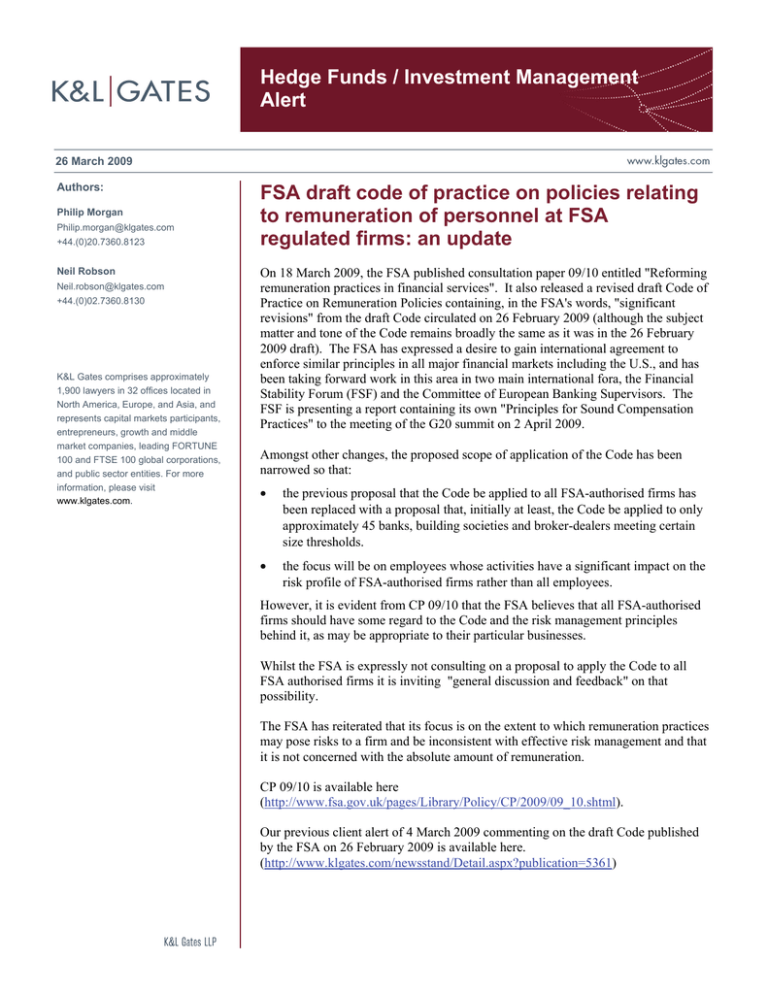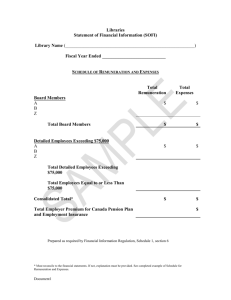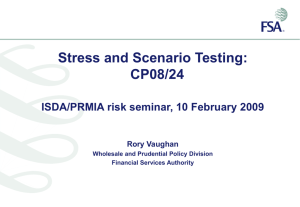
Hedge Funds / Investment Management
Alert
26 March 2009
Authors:
Philip Morgan
Philip.morgan@klgates.com
+44.(0)20.7360.8123
Neil Robson
Neil.robson@klgates.com
+44.(0)02.7360.8130
K&L Gates comprises approximately
1,900 lawyers in 32 offices located in
North America, Europe, and Asia, and
represents capital markets participants,
entrepreneurs, growth and middle
market companies, leading FORTUNE
100 and FTSE 100 global corporations,
and public sector entities. For more
information, please visit
www.klgates.com.
FSA draft code of practice on policies relating
to remuneration of personnel at FSA
regulated firms: an update
On 18 March 2009, the FSA published consultation paper 09/10 entitled "Reforming
remuneration practices in financial services". It also released a revised draft Code of
Practice on Remuneration Policies containing, in the FSA's words, "significant
revisions" from the draft Code circulated on 26 February 2009 (although the subject
matter and tone of the Code remains broadly the same as it was in the 26 February
2009 draft). The FSA has expressed a desire to gain international agreement to
enforce similar principles in all major financial markets including the U.S., and has
been taking forward work in this area in two main international fora, the Financial
Stability Forum (FSF) and the Committee of European Banking Supervisors. The
FSF is presenting a report containing its own "Principles for Sound Compensation
Practices" to the meeting of the G20 summit on 2 April 2009.
Amongst other changes, the proposed scope of application of the Code has been
narrowed so that:
•
the previous proposal that the Code be applied to all FSA-authorised firms has
been replaced with a proposal that, initially at least, the Code be applied to only
approximately 45 banks, building societies and broker-dealers meeting certain
size thresholds.
•
the focus will be on employees whose activities have a significant impact on the
risk profile of FSA-authorised firms rather than all employees.
However, it is evident from CP 09/10 that the FSA believes that all FSA-authorised
firms should have some regard to the Code and the risk management principles
behind it, as may be appropriate to their particular businesses.
Whilst the FSA is expressly not consulting on a proposal to apply the Code to all
FSA authorised firms it is inviting "general discussion and feedback" on that
possibility.
The FSA has reiterated that its focus is on the extent to which remuneration practices
may pose risks to a firm and be inconsistent with effective risk management and that
it is not concerned with the absolute amount of remuneration.
CP 09/10 is available here
(http://www.fsa.gov.uk/pages/Library/Policy/CP/2009/09_10.shtml).
Our previous client alert of 4 March 2009 commenting on the draft Code published
by the FSA on 26 February 2009 is available here.
(http://www.klgates.com/newsstand/Detail.aspx?publication=5361)
Hedge Funds / Investment Management Alert
Timing
The FSA has stated that it wants to be ready to bring
the Code into effect from early November this year,
in time for firms’ 2009 remuneration reviews. To do
this and give firms adequate time to prepare, Alert
Body Copy (10.5 pt. Times New Roman).
the FSA proposes to provide feedback and publish
the final rules (if it decides to make the rules
binding) by early August 2009.
In deciding whether to go ahead with the Code, the
FSA states, however, that it will take into account
progress with implementation of similar initiatives at
an international level. The FSA has said that it will
work closely with other financial supervisors over
the coming months to ensure consistent
implementation with a view to reaching a position
where there is "satisfactory alignment of
implementation plans by the authorities in the major
financial centres". The FSA recognises that acting
alone it cannot influence the group-level practices of
non-UK firms acting in the UK market, nor the
practices followed in other financial centres where
UK banks have activities.
Scope Of Firms To Which The Code Is
Now Proposed To Apply
The FSA now proposes that the Code would apply
to the following:
FSA-authorised banks and building societies which
meet either or both of the following criteria:
a.
b. part of an international financial group
whose regulatory capital is in excess of £20
billion or the equivalent amount in another
currency,
FSA-authorised investment firms (BIPRU ‘730k’
firms) which meet either or both of the following
criteria:
a.
2. If it was decided to extend the scope of the Code
to all FSA firms, the FSA considers that the
objectives may need to be different – focusing,
for example, on the risk of conflicts of interest
between an employee and customers. If this
approach is to be followed, the FSA will need to
assess this in more detail before any firm
proposals are published.
consolidated regulatory capital in the UKauthorised entity in excess of £750 million
or its equivalent amount in a foreign
currency; and/ or
b. part of an international financial group
whose total regulatory capital is in excess
of £5 billion or its equivalent amount in a
foreign currency.
Reasons For Narrowed Scope Of
Firms To Which The Code Is Proposed
To Apply
The reasons the FSA has given for this policy shift
are in summary as follows:
1. The focus of the FSA's concern in CP09/10 is on
the extent to which inappropriate remuneration
practices may have contributed to the current
market crisis and on ways in which this risk can
be addressed in the future. In the FSA's view as
expressed in CP 09/10, "this risk is concentrated
in the practices of a relatively small number of
large firms, rather than in the general body of
FSA authorised firms".
consolidated regulatory capital in the UK
banking entities in excess of £1 billion;
and/ or
The FSA comments in CP 09/10 that these criteria
would result in the Code becoming applicable to
approximately 45 of the largest banks, building
societies and broker dealers operating in the UK.
Relevance of the Code to FSA
Regulated Firms Not Meeting the
Proposed Size Thresholds
The FSA is encouraging all FSA-authorised firms to
review their remuneration policies having regard to
the principles underpinning the Code. The FSA
notes in CP09/10 that:
•
the basic principles behind the Code – good
governance in making remuneration policy and
implementing it effectively, sound practices in
the measurement of performance for
determining bonuses, and ensuring that
remuneration structures do not encourage an
excessively short term approach or excessive
26 March 2009
2
Hedge Funds / Investment Management Alert
risk taking – are good practice for all firms,
whatever their size or the nature of their
business;
•
•
the general requirement that a firm must
establish, implement and maintain remuneration
policies, procedures and practices that are
consistent with and promote effective risk
management is "self evidently a high-level
requirement which should be followed by all
firms"; and
it will, as soon as possible, be taking steps to
increase its focus within its supervisory
programmes on the potential risks posed by
inappropriate remuneration practices in all FSAauthorised firms.
As a result, it remains advisable for all FSAauthorised firms to begin to assess their current
remuneration policies having regard to the draft
Code and specifically to assess whether their
remuneration policies, procedures and practices are
consistent with and promote effective risk
management. In doing this, firms (other than firms
to whom it is proposed the Code would apply
directly) should not be concerned that some parts of
the Code may not be directly relevant to them - for
example if they have no remuneration committee or
risk function - but should instead focus on any
material risks applicable to their particular business,
taking into account its scale and particular
characteristics.
Proposed Legal Force of the Code
The FSA proposes to incorporate the Code into the
FSA Handbook (in the Senior Management
Arrangements, Systems and Controls sourcebook).
However, only the "general requirement" (described
below) would be a rule, the other principles and
commentary being, respectively, evidential
provisions and guidance. An evidential provision in
the FSA Handbook has evidential value in showing
that another rule has been breached or complied
with. Thus, compliance with the principles other
than the general requirement would tend to show
compliance with the general requirement (and vice
versa for non-compliance). This mechanism makes
the Code more flexible in its application than it
would be if all the principles were to be given the
status of rules in their own right.
We set out below a summary of the FSA's amended
proposals for the Code's provisions:
General Requirement: Proposed Rule
A firm must establish, implement and maintain
remuneration policies, procedures and practices
that are consistent with and promote effective
risk management.
The FSA's proposed guidance on the rule states that
if a firm’s remuneration policy is not aligned with
effective risk management it is likely that
employees will have incentives to act in ways that
might undermine effective risk management. It also
comments that the actions a firm must take to
comply with the Code will vary according to the
nature, scale and complexity of the firm and its
activities.
Proposed Remuneration Principles
Principle 1: Role of bodies responsible for
remuneration policies and their members
A remuneration committee should: (a) exercise,
and be constituted in a way that enables it to
exercise, independent judgment; (b) be able to
demonstrate that its decisions are consistent with
a reasonable assessment of the firm’s financial
situation and future prospects; (c) have the skills
and experience to reach an independent
judgment on the suitability of the policy,
including its implications for risk and risk
management; and (d) be responsible for
approving and periodically reviewing the
remuneration policy and its adequacy and
effectiveness.
The FSA's proposed guidance states that
remuneration committees should normally include
one or more non-executive directors with practical
skills and experience of risk management, and
should receive regular reports directly from the
firm’s risk management function on the implications
of the remuneration policy for risk and risk
management.
Principle 2: Procedures and input of the risk and
compliance functions
26 March 2009
3
Hedge Funds / Investment Management Alert
Procedures for setting remuneration within a
firm should be clear and documented, and should
include appropriate measures to manage conflicts
of interest. A firm’s risk management and
compliance functions should have significant
input into setting remuneration for other
business areas.
The FSA's proposed guidance states that conflicts of
interest can easily arise when employees are
involved in the determination of remuneration for
their own business area. Where these could arise,
they need to be managed by having in place
independent roles for control functions including,
notably, risk management departments. It is good
practice to seek input from a firm’s human resources
function when setting remuneration for other
business areas.
Principle 3: Risk and compliance function
remuneration
Remuneration for employees in risk management
and compliance functions should be determined
independently of other business areas. Risk and
compliance functions should have performance
metrics based on the achievement of the
objectives of those functions.
The FSA's proposed guidance on this principle states
that the need to avoid undue influence is particularly
important where employees from the control
functions are embedded in other business areas.
Remuneration Principle 3 does not prevent the views
of other business areas being sought as an
appropriate part of the assessment process.
However, the FSA would generally expect the ratio
of the potential variable component of remuneration
to the fixed component of remuneration to be
significantly lower for employees in risk
management and compliance functions than for
employees in other business areas whose potential
bonus is a significant proportion of their
remuneration. Firms should ensure that the total
remuneration package offered to those employees is
sufficient to attract and retain staff with the skills,
knowledge and expertise to discharge those
functions.
Principle 4: Profit-based measurement and riskadjustment
Assessments of financial performance used to
calculate bonus pools should be based principally
on profits. A bonus pool calculation should
include an adjustment for current and future
risk, and take into account the cost of capital
employed and liquidity required.
The FSA's proposed guidance states that measuring
performance based wholly or mainly on revenues or
turnover can provide an incentive for employees to
pay insufficient regard to the quality of business
undertaken or services provided, or their
appropriateness for the client. Profits are a better
measure, but they should be adjusted for risk,
including future risks not adequately captured by
accounting profits.
Principle 5: Long-term performance
measurement
The assessment process for the performancerelated component of an employee’s
remuneration should be designed to ensure
assessment is based on longer-term performance.
The FSA's proposed guidance notes that profits
from a firm’s activities can be volatile and subject
to cycles, and so the performance-related
component of remuneration should not be assessed
solely on the results of the current financial year.
Principle 6: Non-financial performance metrics
Non-financial performance metrics should form
a significant part of the performance assessment
process. Non-financial performance metrics
should include adherence to effective risk
management and compliance with the regulatory
system and with relevant overseas regulatory
requirements.
The FSA's proposed guidance comments that poor
performance in non-financial metrics such as poor
risk management or other behaviours contrary to
firm values can pose significant risks for a firm and
should, as appropriate, override metrics of financial
performance.
Principle 7: Measurement of performance for
long-term incentive plans
26 March 2009
4
Hedge Funds / Investment Management Alert
The measurement of performance for long-term
incentive plans, including those based on the
performance of shares, should be risk-adjusted.
The FSA's proposed guidance comments that
common measures of share performance, such as
earnings per share ("EPS") and total shareholder
return ("TSR"), are not adjusted for longer-term risk
factors. If incentive plans mature within a two to
four year period and are based on EPS or TSR,
strategies can be devised to boost EPS or TSR
during the life of the plan, to the detriment of the
true longer-term health of a firm.
Principle 8: Fully flexible bonus policies
The fixed component of remuneration should be
a sufficient proportion of total remuneration to
allow a firm to operate a fully flexible bonus
policy.
The FSA's proposed guidance comments that if the
fixed component (typically, base salary) of
employee remuneration is low a firm will find it
difficult to cut or eliminate a bonus in a poor
financial year. One measure of the effectiveness of
this principle would be the ability of a firm (or part
of it) not to pay a bonus in a year in which the firm
(or part of it) makes a loss.
Principle 9: Deferment of the majority of any
significant bonus
The majority of any bonus should be deferred
with a minimum vesting period if, when
compared with the fixed component of an
employee’s remuneration, the bonus is a
significant proportion of that fixed component.
The FSA's proposed guidance comments that an
example of good practice would be for at least twothirds of the bonus to be deferred. The vesting
period of the deferred element should be appropriate
to the nature of the business and its risks.
Principle 10: Linking deferred elements to the
firm’s future performance
Any deferred element of the variable component
of remuneration should be linked to the future
performance of the firm as well as the employee’s
division or business unit.
The FSA's proposed guidance comments that if
variable remuneration is paid out without any link to
future performance, employees have less incentive
to take future risk into account, and firms are
exposed to the risk of paying out variable
remuneration which proves not to be justified by
results. Deferred remuneration paid in shares can
meet Remuneration Principle 10 provided that the
scheme meets appropriate criteria, including riskadjustment of the share performance measure as
described in Remuneration Principle 4. In addition
deferred remuneration paid in cash should also be
subject to performance criteria.
Consultation Deadlines
The FSA has invited:
•
comments on the proposed implementation of
the Code for larger banks and broker dealers
until 18 May 2009; and/ or
•
feedback on the possibility of extending the
Code to other FSA-authorised firms until 18
June 2009.
K&L Gates comprises multiple affiliated partnerships: a limited liability partnership with the full name K&L Gates LLP qualified in Delaware and
maintaining offices throughout the U.S., in Berlin and Frankfurt, Germany, in Beijing (K&L Gates LLP Beijing Representative Office), in Singapore
(K&L Gates LLP Singapore Representative Office), and in Shanghai (K&L Gates LLP Shanghai Representative Office); a limited liability partnership
(also named K&L Gates LLP) incorporated in England and maintaining our London and Paris offices; a Taiwan general partnership (K&L Gates)
which practices from our Taipei office; and a Hong Kong general partnership (K&L Gates, Solicitors) which practices from our Hong Kong office.
K&L Gates maintains appropriate registrations in the jurisdictions in which its offices are located. A list of the partners in each entity is available for
inspection at any K&L Gates office.
This publication is for informational purposes and does not contain or convey legal advice. The information herein should not be used or relied upon
in regard to any particular facts or circumstances without first consulting a lawyer.
©2009 K&L Gates LLP. All Rights Reserved.
26 March 2009
5





